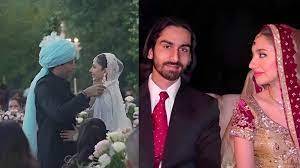
The paths of divorce and second marriages often lead to intriguing crossroads in Pakistan. While it may seem like a matter of fact that after divorce, both parties should have an equal right to remarry, the reality is far more complicated, especially for divorced women.
This complexity was recently brought to light during a weekend marked by a heartwarming celebration—a world-renowned Pakistani model and actor exchanged vows with her long-time beau in an intimate ceremony. However, what should have been a joyous occasion quickly ignited a digital firestorm among Pakistani keyboard warriors, who were not having it.
This leaves one wondering: why has she become the target of such harsh online campaign? Could it be because she is divorced? Could it be because of her exceptional success, which seems unattainable for 99.99% of Pakistani men? This also raises the question: why does a woman's second marriage provoke such reactions in a nation obsessed with all things matrimonial?
However, the answer goes beyond the surface. It's a conundrum that transcends religious beliefs. The core issue lies in the deeply entrenched taboos surrounding divorce and women's second marriages, coupled with the persistent desire of men in the region to exert control over women's bodies and sexuality. The intense scrutiny she faces reflects a complex mix of societal norms, gender roles, and an unfortunate double standard that still exists in many regions of the world including Pakistan.
Some of these thinly veiled sexist comments raise questions about the true reasons behind these remarks and whether they stem from genuine concerns about the so called tradition or a reluctance to accept a woman’s choices.
Remarkably, Islamic jurisprudence not only acknowledge a woman's right to divorce but also her right to remarry, even though Pakistani (Muslim) family laws may not explicitly mention the latter. It is, however, considered a presumed right of a divorced or widowed women.
Yet, the path to remarriage for women is often obstructed by societal norms. Women, if they have children and are divorced or widowed, are usually expected to renounce all worldly desires and dedicate their lives to their children.
In stark contrast, no such restrictions apply to divorced or widower fathers, who can marry multiple times without a second thought. This paradoxical practice reflects an insidious influence of patriarchy on women's lives, despite its incongruity with Islamic jurisprudence.
Islamic Jurisprudence bestows mothers with the right to custody of their minor daughters until they reach puberty and their sons until the age of seven.
However, the child's preference is also taken into account and given the highest weightage. Until recently, a divorced or a widowed mother's remarriage was considered a valid ground to deprive her of the custody and instead grant it to the father or the father’s parents. It essentially acted as a deterrent to the remarriage of divorced and widowed women.
This continued until last year when Justices Shah and Malik of the Supreme Court of Pakistan recognized the antiquated and prejudiced nature of this reasoning in the case titled ‘Raja Muhammad Owais Versus Mst. Nazia Jabeen’, ruling that remarriage cannot be used as a valid ground to deny custody to women.
As a consequence of this ruling, this avenue for criticism and hostility against the remarriage of women has been effectively sealed off by the highest court in Pakistan.
Nevertheless, the practical application of this decision in the lower courts of the country, where the personal biases and antiquated viewpoints of judges continue to hold sway, remains a matter of ongoing debate. The final outcome of each custody case is, to a significant extent, shaped by these deeply ingrained prejudices.
For the time being, in theory at least, there is no legal impediment to the remarriage of a divorced or widowed woman. Yet, this hurdle persists primarily in the minds of certain individuals who try to act as guardians of oppressive and discriminatory societal norms.
Their attempt to project their beliefs onto others casts a shadow over the rightful freedom of women to make choices about their own lives. And when they can no longer wield their children as a means to control the choices of women, their frustration becomes apparent. At last, now it all makes sense.

